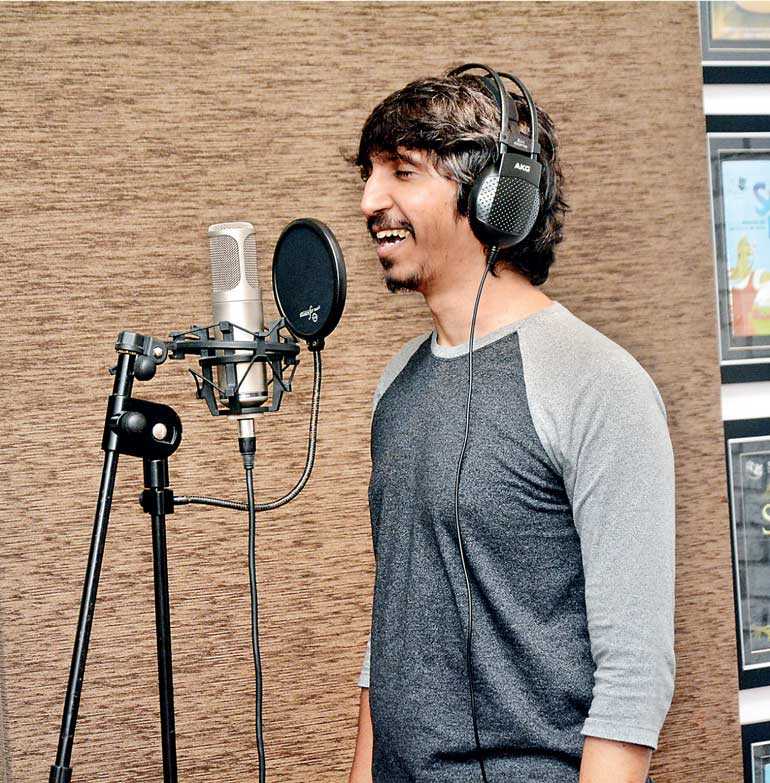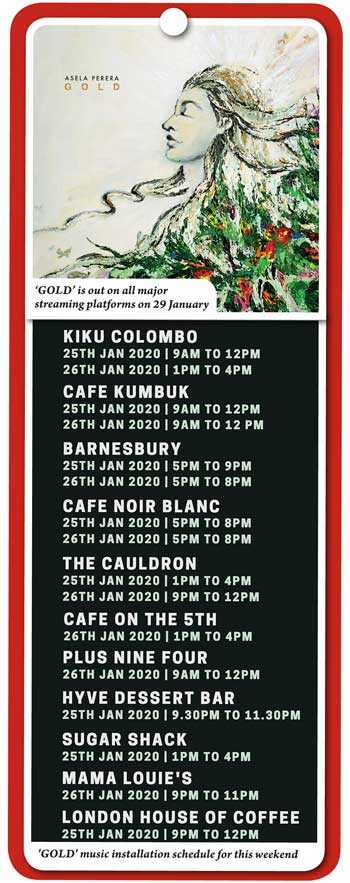Tuesday Feb 17, 2026
Tuesday Feb 17, 2026
Saturday, 25 January 2020 00:05 - - {{hitsCtrl.values.hits}}

Asela Perera
 By Madushka Balasuriya
By Madushka Balasuriya
A confluence of sounds, instruments and influences sets apart Asela Perera’s aspirational sophomore album, as it marks a striking departure from the singer/songwriter roots that permeated right through his 2016 debut ‘These Years’.
‘GOLD,’ which is out on all major streaming platforms on 29 January, is an exercise in experimentation and pushing boundaries, but at the same time manages to stay true to the essence of Asela’s creativity.
But knowing what fans expect, Asela doesn’t throw you in the deep end straight away, instead easing you in to the changes with the first minute or so of the opening track, ‘Design,’ simply him singing over the light strum of a guitar.
“Can’t you see? All your seams are not the lines that which define,” he croons, as the song ramps up, and the string instruments, electric guitar and drums kick in.
The song itself is about “breaking the status quo,” explains Asela, which is a fitting entry point into such an ambitious project.
“The song is quite different to what I’ve done previously, it’s a lot more complete sounding – there’s drums, base, electric guitars, strings, and all that,” Asela tells Daily FT in an exclusive interview. “But also in terms of the subject it talks about, it’s about breaking the status quo, having this whole thought that you’re brought up from childhood to believe in certain things. To have certain religious beliefs, to have a certain way that you look at your own life, things like that.
“Which is all fine, there’s no right and wrong, but also that you have to be – it’s always good to be open minded, and have two-way conversations.
“The song was also special to me because, having taken a break from the previous album, the reason that I got back into it was because I wanted to do something different and not repeat the same thing all over again.”
“There once was a man, who lived in fear, of the day that would come, take all he holds dear”
That creative ambition reaches its zenith with ‘Silence,’ a bass-heavy, synth-infused, electronic juggernaut, that comes up right at the midway point of the album, and manages to cram in an impressive array of vocal distortions and instrumental cameos in its relatively short 2:43 runtime.
For the album’s recording, mixing and mastering engineer, Nishan Daniel, this was easily the standout track in the album.
“That’s one song in the entire album where when we sat down we had kind of no idea where it was going to go,” recalls Nishan. “We recorded a dummy track, and what I usually do is ask him [Asela] for a reference – not to copy off somebody else, but to get the feel of what he’s looking for. He gave a reference of a band called Massive Attack.
“For us, when we listen to it sometimes, we can’t believe how far that song came. It was a bit of tough song to do also, because we kept tweaking, we kept changing things.”
The end result is a track that is by far the most removed from Asela’s traditional acoustic sound, though I have a hunch his fans won’t be complaining too much when they eventually get a chance to hear it.
But if ‘Silence’ is Asela allowing his creative fire to run wild, then the eponymous ‘GOLD’ is an exercise in simply having fun.
“There once was a man, who lived in fear, of the day that would come, take all he holds dear,” he sings, with the flow of a bard regaling tales at a tavern. In the background the jaunty strings of the Guzheng – a Chinese plucked string instrument – saunter away, while later in the track a combination of a gong, trombone, snare, and tambourine combine for a truly whimsical outro. It’s lyrically though where the song hits its stride, telling a riches to rags story, one of finding comfort in reaching a point of having nothing to lose.
“GOLD as the title track, and indeed the album, tackles the notion of happiness, of co-existence and what it could mean to be human,” explains Asela. “It is my attempt to draw some sense in a world that in this day and age seems even closer to teetering over a cliff of ignorance.”
“Do we live to fight? Or tell me do we fight to live another day?”
In terms of sound however, none of this would have been possible without Nishan’s tireless efforts, who aside from engineering the album also co-produced it alongside Asela and former Commonwealth Music Ambassador Natasha Senanayake.
In fact, the album is a far more collaborative effort than Asela’s self-produced debut effort, with the likes of Senanayake, Kavya Boteju and Crisantha De Silva providing vocals, and a host of other musicians also contributing.
Having worked on several fairly large scale compilation projects before, Nishan has no hesitation in admitting that this was by far his most challenging – and satisfying – work.
“This album has been the standard-bearer, the best work that I have done in the last so many years,” gushes Nishan.
“Simply because, one, we’re friends, we understand each other, we understand the vibe. And two, because there’ve been so many people involved in it, and when people are involved especially in making music, the ideas that come in – everybody brings something different to the table. So that experience has been kind of really amazing.
“This album has been one, where you might go through a difficult day or week, but I always look forward to working on this because it’s been so different from the other projects I’ve been working on.”
Indeed, he describes it as an album of “a lot weekday evenings,” which pretty succinctly sums up the process of putting it together. With work and life to navigate, he and Asela would have to settle for meeting after work on most days for about two hours. This daily grind is referenced in the album’s second track, ‘Try’.
“Do we live to fight? Or tell me do we fight to live another day?” Asela ponders, as the music, all guitar, drums and percussion, evokes Eddie Vedder’s work on the soundtrack for ‘Into the Wild’ – which incidentally was a movie about a man fed up of the grind of everyday life, choosing to go live in the wilderness.
“In the night when you’re driving, seated without a sound, surrounded by the few who understand, peace in mind’s eye”
But the process of creating this album, which began circa 2017, would also end up becoming a form of “self-therapy” for Asela who was coping with loss in his personal life.
“In the process of all of this I was dealing with my mom going through a difficult time, she was terminally ill. You tend to reach out to music at the most difficult of times and that sort of also sparked a place for me to write music again, because I’ve always gone to music for ‘self-therapy’,” he reveals. “It’s not really written for anybody else, I’m not really adept at speaking my mind all the time so it’s easier for me to just write it into music. In the last couple of years, it’s pretty much been a saving grace for me to have this.”
The track ‘Your Satellite & Our Signal Fire,’ dives further into the wide-spanning impact the loss of a loved one can have on you and those around you. Fittingly, it’s also one of the songs in the album that really allows Asela’s voice to take centre stage; completely stripped down, it foregoes the expansive use of instruments found in many of the other tracks.
“It’s an emotional song, where if you listen to it there is not really much going on by way of music. It’s very simple. Almost like the music is just there as a bed and the vocals are what’s doing the heavy lifting. Before we started on a track we’d always think about what direction we wanted to take it in, and the lyrics were an important thing,” explains Asela.
“It’s a song which was very personal to me. It battles with the idea of losing a loved one, and how it’s the people that are left behind that have to deal with the ramifications of it, and getting through that. How a support group is very essential.”
In that sense, in an album where its sound veers across genres, the final track in the album, ‘Breathe Easy,’ brings to a cathartic close Asela’s journey, of finding his voice amidst the noise, overcoming loss, and finding family in those around you.
“In the night when you’re driving, seated without a sound, surrounded by the few who understand, peace in mind’s eye,” he sings gently over the sound over the sound of a guitar. “You breathe easy.”
Ahead of the launch of ‘GOLD’ on 29 January, Asela will be having special installations at cafés around Colombo this weekend, where you can listen to his album in full on specially curated headphones.

About Asela Perera
Asela Perera is an Indie singer/songwriter from Colombo, Sri Lanka who has been writing original music for the last 11 years. His work ranges from a multitude of EPs to an album called ‘These Years’ and so far has featured a mellow contemplative acoustic sound.
Asela is also a co-founder of a music concert community series in Sri Lanka called The Melomanic Sessions which fosters local artistes and bands by providing them a platform to express their original creative views and compositions.
Pix by Upul Abayasekara